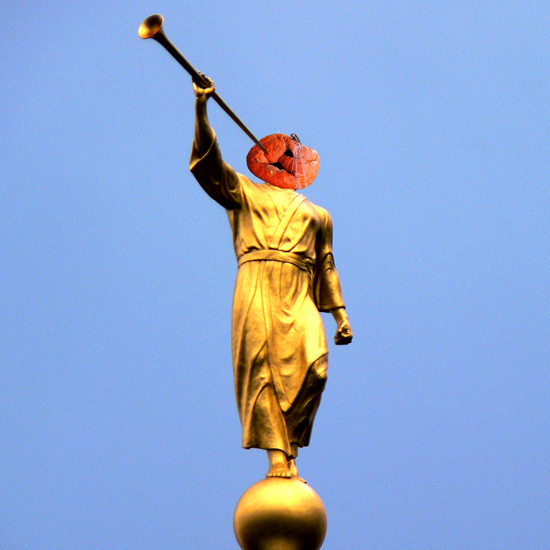Editors’ Note: This article is part of the Patheos Public Square on Faith and Reason. Read other perspectives here.
The problem with making religion a rational phenomenon is that we then presume that religion means knowing stuff.
Put your daggers down, a sec’, and hear me out. I am not at all suggesting that religion depends on our ignorance. A neo-orthodox element of my own religious tradition would have us accept that having stuff in our heads is an impediment to getting into heaven (or, at best, having stuff in our heads is of no consequence). Unequivocally and unapologetically, I insist that this element of my own tradition is wrong—completely, thoroughly, and perfectly wrong. Damned wrong.
Having stuff in your head is most certainly a good thing, and having more stuff in your head is certainly better than having less. Like a lot of terms, to know has more than one use, and, as happens with a lot of terms, some of the uses of to know don’t have a lot to do with each other.
We use to know not only to indicate having stuff in our heads, but also to indicate certainty. “I know my multiplication tables” is an example of the former use. “I know this Presidential election cycle is a disaster” is an example of the latter use.
The former use is crucial to religion. The latter, maybe not so much, though we’ve been thinking otherwise for a few centuries. We need to know the atomic weight of Cadmium, ’cause nuclear reactors, and such. But the Enlightenment’s insistence that everything will make rational sense, eventually, if we just think it through far enough, generated an anxiety in the West that religion—if it is to have any legitimacy—must also rest on a convincingly logical rationale. Otherwise, we must regard religion as the legacy of a primitive time, better to sink in the wake of modernity along with feudalism and bloodletting.
The modern West, then, has been wrestling for a few centuries with the problem of making religion make sense, to the end that we can have some certainty, that we can know something religious—know god, know salvation, know truth—because it all makes sense.
Of course sense also has more than one sense. In fact, the flexibility of sense has provided for Western Christianity’s prevailing strategy to wrangle a place for religion in the enlightened world. The logic of religion is not nearly so important as religion’s sensation, went the immediate response to the Enlightenment’s critique of religion. Articulating, perhaps, better than others, German theologian Friedrich Schleiermacher wrote in the early nineteenth century that putting stuff in one’s head is one thing, but real certainty about the stuff of religion—god, particularly—does not get stuffed into one’s head. It, rather, manifests as one’s felt experience.
Founding religion on the incontestability of experience didn’t protect religion from reason, it gave religion over to reason. The experience of god, wrote Schleiermacher is its own certainty. Insofar as the experience itself is an incontestable part of folks’ reality (of the reality, at any rate, of folks who have the experience), religious experience supports a perfectly reasonable rationale for religion.
Experience, in the modern age, then, has been the source of rational certainty, whereby we know god, etc., with as much confidence as we know that two plus two equals four. I know I am saved, in some Christian traditions, is a pseudo-logical expression derived from acknowledging a certain, personal experience that operates as a self-evident first principle. I know god lives, and other such expressions in my own, Mormon tradition, are similar. The foundation of certainty is a certain experience that we suppose is, itself, incontestable.
But I’m not certain that we should be so certain. The modern moment has passed, now, and a new interrogation of humanism has made religion’s argument-from-personal-experience obsolete. It’s no longer clear that we have personal identities with which to have private experience. If the psychologists and philosophers are right—if there is no such thing as personal experience—such experience can hardly be the rational ground for a justification of religion. With the loss of personhood passes any certainty that personal experience might have afforded, and so passes any religion that depends on experience as the self-evident principle of its proof.
But postmodernism need not be the death of religion. All we have to do is give up that relatively recent notion that religion depends on rational or pseudo-rational certainty. And that’s easy. You can’t really give up scientific certainty. Two plus two not only does equal four, it must. Scientific certainty is bound to what is necessary. We can go on struggling to realize religion as a catalog of necessary things, or we can see that religion works better when it shrugs off necessity and says I don’t know.
That religion—that unknowing, unnecessary religion—is fundamentally irrational, but not in conflict with the perfectly sound logic by which we recognize such things as the process of biological evolution and the human influence on global warming as necessities. Postmodern, a-knowing religion is not even in conflict with the stuffing of heads full of sociology and history and math and philosophy. The senseless religion we need to reclaim from the Enlightenment’s seduction is a creative mode in which knowledge and all it mandates blooms into mad, pointless beauty.
It may even be that this postmodern condition we’re in—characterized essentially as the confession that we know nothing—is the most purely religious of all human ages, so far.* Still with us are the ugly, hostile fundamentalisms, whose certainties will always be the enemy of human being. But, increasingly, and as the antidote to the anti-human pathologies that call themselves religion, we have performance art, and drag shows, and independent films, and photo montages, and conceptual dances, and multimedia sculptures, and naked yoga, and tattoos, and all of the other perfectly irrational acts by which humanity asserts its existence, rather than its understanding.
Traditional religious acts have always been similarly avant-garde. The mass is as much un-reasonable as Chris Burden’s Trans-Fixed, and as beautiful in its revelation that we are here whether or not we are necessary. Darshan, in Radharaman mandir, is as pointlessly meaningful as Abramovic’s The Artist Is Present in the MoMA. “Mormon underwear” has the same goofy greatness as Christo’s The Gates: this is not necessary, this is not natural, this does not make sense, and does not solve a problem.
Physics will worry about what is necessary. Physics has the tools for it. But forget about certainty, which can’t be had. Where religion is concerned, we need to stop saying things like I know, as though this declaration of certainty is not a foundation of sand. When we labor to make religion make sense, to rise from some presumably self-evident notion that we just know into a grand and convincing, logical structure, we end up with the hateful violence of extremists. In the religion that does not know, that is not certain, that is not necessary, people can better play together. And in that creative play, divinity much more surely and clearly appears.**
Where religion works—where it has always worked as an always postmodern phenomenon***—is in the arrogant creativity by which it celebrates the limits of certainty and lets us play in the joyous terror surrounding it.
—————
* The current spiritual but not religious mantra, which seems so postmodern, is only a two-centuries-after-the-fact recapitulation of Schleiermacher’s insistence that real religion is not in institutions, rituals, and doctrines, but in the private self’s ineffable communion with divinity.
** Consider a “central theme” of Adam B. Seligman’s, Robert P. Weller’s, Michael J. Pruett’s, and Bennett Simon’s examination of religious activity in Ritual and Its Consequences: “the capacity of human beings not only to tolerate ambiguity but even to generate it creatively as a tool for coping with the contradictory demands of existence in the world” (12). Ritual, these authors aver, creates a “shared subjunctive” mode of existence—inherently uncertain, inherently playful, inherently open to imagination—that recognizes “the ambiguity built into social life and its relationships” (7).
*** There’s a multitude of illustrative examples from all religious traditions. Consider the suggestively-titled Cloud of Unknowing, a text from Europe’s late middle ages, which draws on a Christian theme that goes back at least as far as Augustine. Anything you know, insists the Cloud, with a distinctly postmodern flourish, surely is not god.












